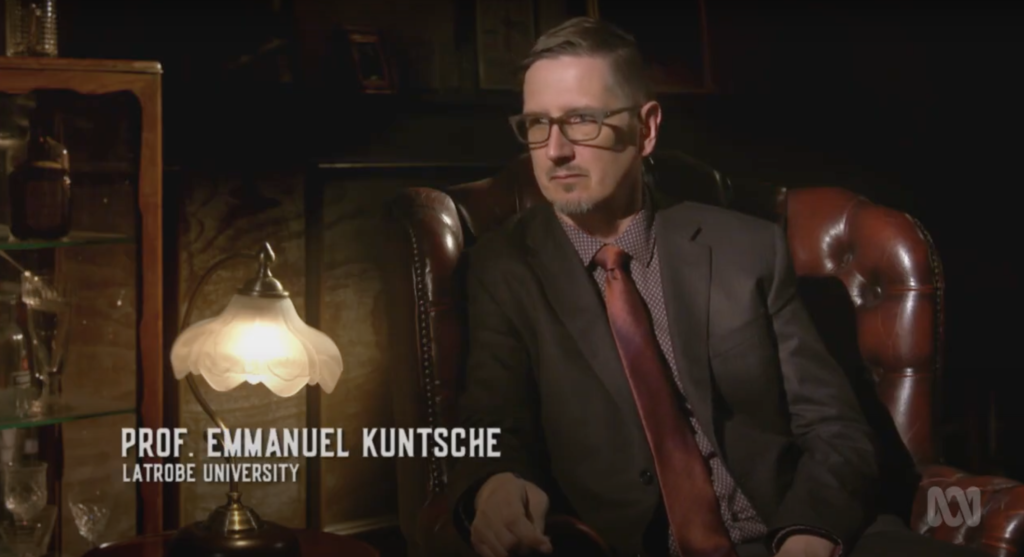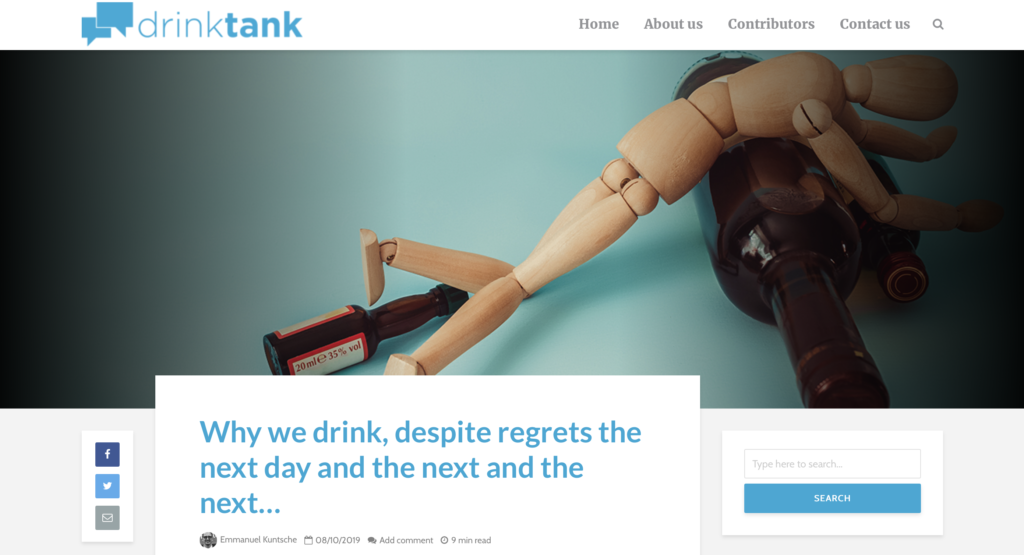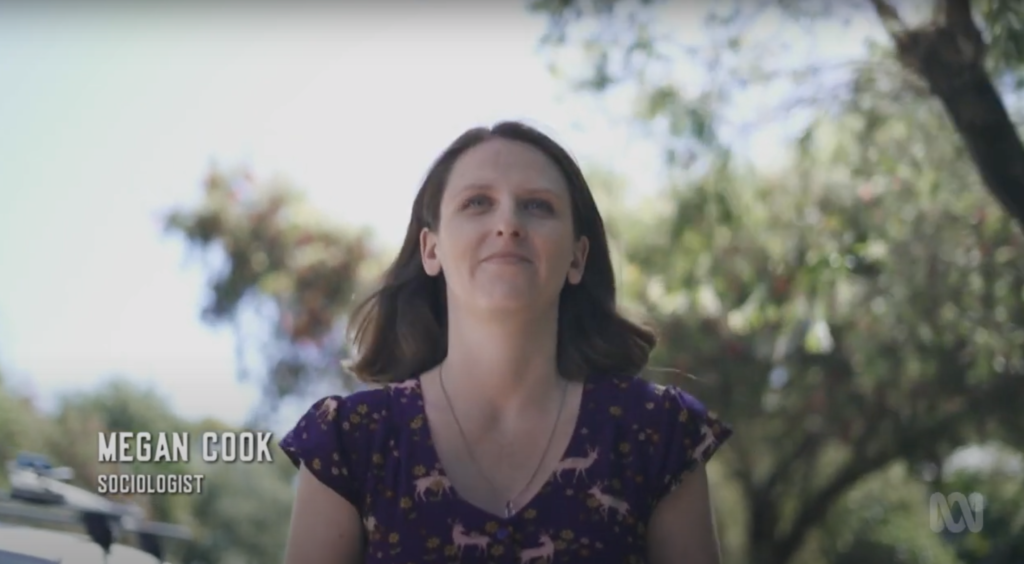This guest expert opinion is written by Professor Emmanuel Kuntsche, Director of the Centre for Alcohol Policy Research, La Trobe University, with contributions of Susanne Newton, Michael Livingston and Sandra Kuntsche.

The comedian Shaun Micallef is an Australian icon, perhaps best known for his satirical award-winning news comedy series ‘Mad as Hell’, which has been screened by the Australian Broadcasting Company (ABC) since 2012. Shaun decided to live free from alcohol in his early twenties. He now has children approaching the legal age for alcohol use, and his new series ‘On the Sauce’ is an attempt to figure out how to advise his own children about alcohol. The three-episode series covering Australia’s alcohol consumption past, present and possible future involves Shaun travelling all around Australia exploring the culture’s relationship with alcohol.
When Tony Jackson, producer of ‘On the Sauce’, first approached me about whether I would be interested in contributing to a television show exploring Australian alcohol culture I was sceptical. Although some people tend to laugh about it or ridicule themselves under the influence of it, alcohol is a serious topic. Having devoted my entire career to alcohol research, I am very familiar with the harm resulting from alcohol use.
You have to be entertaining to catch the attention of people”, Tony explained to me.
If people are listening to you, you can convey a serious message.”
Tony Jackson, producer, On the Sauce
This convinced me and I started talking with him about the results of my research and the insights I have gained over more than two decades of alcohol research. Having spent most of my career researching alcohol consumption motives,[1] I served as the show’s resident psychologist, trying to explain – in my German accent – why people and cultures remain fascinated by alcohol.
In some aspects, the content of ‘On the Sauce’ reminded me of the 2016 British Broadcasting Corporation (BBC) documentary The Truth About Alcohol. It was produced after the United Kingdom (UK) lowered the recommended amount of alcohol from 21 to 14 units of alcohol per week, spread throughout the week for men in the UK – the equivalent of about seven pints of beer. The BBC documentary follows an emergency room doctor as he explores the effects of alcohol on the body and answers questions about why some people are more sensitive to alcohol, hangover remedies, alcohol use on an empty stomach, the presumed benefits of red wine, effects of nightcaps on sleep, and other common questions.
Although personally I found the BBC documentary very insightful and well put together, the response has been mixed.
We learn that it’s bad for you, and the more you put into yourself, the worse it gets” wrote The Guardian and concluded,
So, no massive surprises here then. It’s pretty much as you were: booze is basically not good for you and you should almost certainly drink less, and less often.”
The Guardian, review of BBC documentary ‘The Truth About Alcohol’, 2016
Why is it so difficult for people to follow this advice?
The setup of ‘On the Sauce’ is different and reminded me a bit of the early Michael Moore documentaries where he comes across quite innocently. Michael would seem to tell the facts in a neutral, non-judgemental way and leave it to the spectator to connect the dots and discover the uncomfortable truth behind these ‘facts’. ‘On the Sauce’ goes one step further and blends comedy and seriousness in a way that is both entertaining and informative, touching on personal experiences while explaining clearly the harmful effects of alcohol. An example is the very first scene, where Shaun tells the story of his then 76-year-old great-great-grandfather who fell asleep on the way home from a country pub in the spot Shaun is standing, one hundred years earlier. Shaun’s ancestor was set alight by his own still-lit pipe – and died.
Sure, it’s funny now,” Micallef tells the audience.
But I wonder if, back in 1920, he hadn’t had so much to drink at the Snowtown Hotel, and so hadn’t fallen asleep – or been as flammable – my now 176-year-old great-great-grandfather would be alive today.”
Shaun Micallef in ‘On the Sauce’
In his curious and almost innocent manner, Shaun sets out to explore Australia’s alcohol culture, placing himself as observer and participant in different scenarios to show how alcohol is used and misused in Australia, with wonder, curiosity and at times horror.
He attends an 18th birthday and learns about jelly shots, goes on a pub crawl with a women’s soccer team in Melbourne, and attends a country Bachelors and Spinsters Ball. At the ball, Shaun is offered a “shoey” where an alcoholic drink is poured into someone’s shoe and then drunk from the shoe. He meets retirees who drink far more standard alcoholic drinks per day than what they would admit to their doctor and visits a book club that is as much about drinking wine as it is about reading.
‘On the Sauce’ is not all jelly shots and “shoeys”. The show also highlights the very real health risks and damage alcohol can cause to mental and physical health. Shaun meets Donna at Flinders Medical Centre, who was dying of chronic liver disease before receiving a liver transplant, who describes herself as a third-generation alcoholic.
You lose everything,” Donna tells Micallef.
They say that alcohol is the great remover, and it does. It removes everything you hold dear.”
Donna, who received a liver transplant due to chronic liver disease
The show also touches on Shaun’s personal and family life when he reveals his wife’s sister passed away from the effects of alcoholism just a few months before filming.
Getting into the negative effects of alcohol in pop culture inevitably risks accusations of wowserism, but ‘On the Sauce’ tries to educate and entertain rather than admonish. Shaun has said of the show,
You don’t want to feel like you’re being told off … I genuinely wanted to go in and just talk to people. And leave the conclusions to those watching.”[2]
Shaun Micallef about ‘On the Sauce’
And this is what makes the show so appealing. It’s a mixture of Australian history and culture, jovial and serious, entertainment and information, personal stories and scientific facts.
The success of the show and its impact is highlighted by how it touched a nerve with the alcohol industry and right-wing media. A columnist from the Australian newspaper, Chris Kenny, criticised the show as:
an insidious intervention by the public broadcaster, setting out to shape the nation in its own, woke way, and happily setting itself against industries – wine, brewing, restaurants, hotels and hospitality – that support vast numbers of Australians… Perhaps the ABC wants to do for these industries what it did for the live cattle export industry and greyhound racing.”[3]
Chris Kenny
In my eyes, this reaction and others show the importance of documentaries like ‘On the Sauce’ and ‘The Truth about Alcohol’ in raising awareness of public health issues through their power to reach large audiences. If these shows can help us rethink our (unhealthy) relationship with alcohol and consume alcohol a bit less or a bit less often, this would be a major achievement. It would help to reduce what is still a major burden to most industrialised societies. The harmful use of alcohol causes three million deaths per year, is a causal factor in over 200 diseases and injury types. Alcohol’s harm also causes significant social and economic losses for individuals and the wider society.[4]
By the age of three or four most children are already introduced to the adult alcohol culture.”
Prof. Emmanuel Kuntsche
These consequences are widely known, and most alcohol users know that they should cut down as the author from the Guardian states. Why is this so difficult to do? The problem is that for most of us, the association with alcohol starts at a very young age. As I explain in the first episode of ‘On the Sauce’, our research has shown that by the age of three or four most children are already introduced to the adult alcohol culture. For the next 10 years, children continuously observe their parents, their aunties and uncles, their grandparents but also other adults on television, in bars and restaurants, at public parks on weekend afternoons, at footy games and in movies and advertisements – all occasions and circumstances in which drinking alcohol is commonplace. Over 10 years, the apparently convivial nature of alcohol is learned and reinforced.
After years and years of observation and exposure, teenagers are often eager to try alcohol, even if it is only to show that they have reached adulthood themselves. Interestingly, while we try to understand why adolescents consume alcohol (because we assume that abstaining is the normal condition and they need a reason to drink), among adults the opposite seems to be the norm as society often questions the reasons not to drink alcohol in a given situation instead of why we use alcohol. It is often assumed that drinking alcohol, e.g. at a social gathering, to celebrate or to toast, is the normality and that someone needs a particular reason to abstain, e.g. being sick or the designated driver. This social expectation or normative misperception is in the minds of many adults, as I explain in the second episode. One person who Shaun interviewed said that he would be ‘suspicious’ of a non-drinker. In the third episode, Shaun asked me about why there is stigma around people like him who don’t drink alcohol or refuse a drink when offered. I said it could be because the person who is drinking alcohol knows it can cause harm, so when someone chooses not to consume alcohol it can hold a mirror to the person who does, and says to them, “you’re the one putting yourself at risk, I’m stepping out of there”.
Alcohol use is much less prevalent than we think.”
Prof. Emmanuel Kuntsche
It can be difficult to say no to an alcoholic drink because, whereas the first time we try alcohol it is usually a conscious decisions to choose it (accepting an offer from a friend, being driven by curiosity, circumstance, the wish to demonstrate being grown up, etc.), as the behaviour is reinforced hundreds and hundreds of times, alcohol use becomes a conditioned response. This means that, like Pavlov’s dog, even a distant stimulus is sufficient to trigger our desire to consume alcohol and take the according action without being aware of it. In this way, people have already ordered their alcoholic drink before even entering the bar after work with their colleagues simply because of the bar setting, the social company and the desire to calm down after a hard day all trigger the decision without us even being aware of it. It’s the same when people go to a sports stadium. Most likely, they will buy and drink the same beverage as the person next to them and the same drink they had when they went to see the game as a little kid.[5]

The conditioned response is so strong, that even though we may drink too much alcohol and embarrass ourselves horrendously, even though we may spend the next day feeling physically sick, the next time we think of alcohol, we’ll remember the fun times we had. We’ll immediately think of the social events, the laughing, the feeling of increased confidence we experienced ourselves or saw in the advertisements so many times. Our conditioned response is that immediate response, the fun, the relaxation, the negative effects, the negative consequences come too late to form part of our conditioned response, as I explain in the second episode of ‘On the Sauce’.
Since alcohol consumption appears omnipresent – in bars, stadiums, parties, barbecues, celebrations at work, when friends are over – we excuse ourselves and others for consuming alcohol too often and sometimes also too much per occasion. But this is all in our mind – alcohol use is much less prevalent than we think as demonstrated by hundreds of scientific studies, a phenomenon called normative misperception. Correcting this misperception by providing people with a detailed summary of the actual consumption instead of what they think their mates consume is an essential approach in alcohol interventions like brief interventions. These aspects are also addressed in an online intervention program for middle-aged women Dr Sandra Kuntsche and Mia Miller are currently developing at the Centre for Alcohol Policy Research (CAPR) at La Trobe University.
But the times are changing. In industrialised countries across the world, there is a generation of young people drinking much less alcohol than previous generations. Dr Michael Livingston and his team at CAPR has spent several years investigating the reason behind this change. The declines appear to be at least partly driven by a growing awareness of the health impacts of alcohol by both parents and young people themselves, resulting in shifts in the role that alcohol plays as a marker of independence and adulthood. The complex interplay between parents and their kids seems central to how alcohol consumption develops for young people.
In the third episode of ‘On the Sauce’, Shaun explores some of the lifestyle of this new generation. Clinton Schultz describes giving up drinking when his son said, “Dad, can you stop drinking silly drink?” and has since started a line of non-alcoholic beers. Shaun meets two young men, Robert and Michael Fitzsimmons who choose a “straight edge” lifestyle, making live music and looking for “real experiences” and avoiding alcohol. One of the most shocking scenes of the whole series is when Megan Cook, a PhD student I co-supervise at CAPR, goes to a childcare centre and demonstrates how much even small children know about alcohol and the effect it has on mummy or daddy.

But it is not only the young generation that is driving this change. The society as a whole places more importance on health and decreasing risks than ever before. There is a long list of examples of from the introduction of seatbelts in cars, mandatory bike helmets, and warning labels on cigarettes and soon also on alcoholic beverages (e.g. for pregnant women in Australia[6]).
Following the series, CAPR hosted a panel session online with over 100 attendees from across Australia watching and asking questions. It featured Megan Cook, Michael Livingston, Caterina Giorgi, the CEO of the Foundation for Alcohol Research and Education (FARE), an independent not-for-profit organisation working to prevent the harm from alcohol, and myself. It continued the discussion raised by the series and can be viewed on YouTube.
The panel event had a broad audience from health departments, alcohol and drug foundations, universities and organisations for those that want to change their relationship with alcohol like Hello Sunday Morning. The discussion carried on the conversation that was started in the series, exploring the rise of home alcohol use and online delivery, especially under COVID, whether the Sydney ‘lock out laws’ had reduced violence, the concept that different drinks cause different emotions, and the need to still raise awareness across Australia about FASD and the links between alcohol and cancer.
The fact that the national broadcasters are producing shows such as ‘On the Sauce’ is a sign that there is an openness and interest to rethink what used to be a widely accepted phenomenon…”
Prof. Emmanuel Kuntsche
One take away was that we need to think about how to change attitudes to alcohol faster than the decades it took for people to think differently about cigarettes. These conversations will continue and in December CAPR will host our next online panel on alcohol in Australia, this time on Wine Mums: moral panic or real risk?
I hope that the fact that the national broadcasters such as ABC and BBC are producing shows such as ‘On the Sauce’ and ‘The Truth About Alcohol’ is a sign that there is an openness and interest in industrialised societies to rethink what used to be a widely accepted phenomenon that yet produces so much harm to individuals, others and the society. In my eyes, informative, non-judgemental and entertaining productions like these can make an important contribution to making alcohol less the ordinary commodity that it is still often considered to be.
Sources
[1] https://theconversation.com/there-are-four-types-of-drinker-which-one-are-you-89377
[2] https://www.broadsheet.com.au/national/entertainment/article/sauce-shaun-micallefs-new-doco-explores-our-turbulent-relationship-booze
[3] https://www.theguardian.com/media/2020/aug/14/johannes-leak-cartoon-of-joe-biden-and-kamala-harris-denounced-as-racist
[4] https://www.who.int/news-room/fact-sheets/detail/alcohol
[5] https://drinktank.org.au/2019/10/why-we-drink-despite-regrets-the-next-day-and-the-next-and-the-next/
[1] https://www.foodstandards.gov.au/industry/labelling/Pages/pregnancy-warning-labels.aspx
About Our Guest Expert

Emmanuel Kuntsche, PhD
Professor Emmanuel Kuntsche has been trained in Psychology (University of Jena, Germany), Sociology (University of Jena, Germany), Public Health (University of Maastricht, the Netherlands) and Statistics (University of Essex, UK). After having worked for 18 years at Addiction Switzerland, he became a Professor of Public Health at La Trobe University, Melbourne, Australia, and the Director of the Center for Alcohol Policy Research.
Prof. E. Kuntsche has published more than 300 scientific articles, book chapters, and research reports (more than 100 in the last five years). He has had editorial appointments at five international journals (currently Addiction and Drug and Alcohol Review).
He is currently investigating the development and transformation of alcohol-related cognition from early childhood into adolescence and the role of parental alcohol socialisation.
